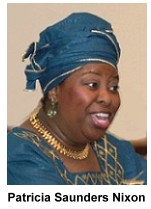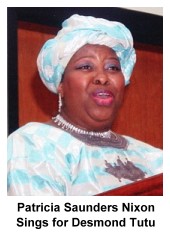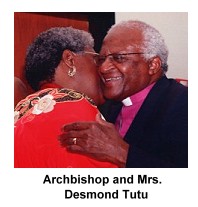
| February 2004, Convenant Presbyterian |
| February, 2005, Ebenezer Baptist Church |
| Patricia Saunders Nixon sings for Desmond Tutu |
| Let My People Go |
ReviewsPatricia Saunders NixonFinally getting to hear a recital by Patricia Saunders Nixon was a long-time goal which came to fruition February 24, 2004 at Covenant Presbyterian Church, two blocks from the Norfolk State University where Mrs. Nixon teaches. She sang a full program of art songs, arias, spirituals and selections from oratorio and Bach cantatas.
The excellent piano work is by Geraldine T. Boone, also a professor at NSU and a well-known musician in Tidewater. She has been a vocal coach and theory teacher at the Governor's School for the Arts and sang in the chorus of Virginia Opera for fourteen years and was on the three-country tour to South America in Porgy and Bess in 1992. Her choral directing experience is extensive. Robert Schumann's songs, Die Lotusblume, Du bist vie eine Blume and Widmung made up her second set. These romantic songs were delivered with fine German song style. In Widmung the delivery was intimate and quiet but with a smoldering passion that builds. W.A. Mozart's concert aria K. 490, Non temer amato bene, was sung with power and precision and a light vocal tone which was delightful to hear. With a voice this big one might expect a heavy tone in lower notes but Ms. Nixon's voice is light and sweet throughout her range. "Wonderful!" was my only written comment on Giuseppe Verdi's D'amor, sull'ali rosee from Il Trovatore. This music was created for this type of soprano voice. Ms. Nixon sang the role of Clara in Gershwin's Porgy and Bess and toured with Virginia Opera and sang in major opera houses in three Latin American countries in 1992. She was last seen in Thea Musgrave's Simon Bolivar. I dream of hearing Ms. Nixon do a major Verdi role at the Harrison Opera House. A set of songs by African-American composer John Work followed. Dancing in the Sun is a vocally demanding and joyous song. Though it is familiar to me I've never heard it done by a voice with this much control and with power in reserve. In This Little Light of Mine the singer slowly opened her hands like a rose opens as her voice opened. And there was the quiet pianissimo too. Soliloquy, also a personal favorite, was fine. As part of the display of Ms. Nixon's talent we heard the Norfolk State University Vocal Jazz Ensemble, which she directs, in two a cappella songs, excellently presented. The recital ended with four songs by Hall Johnson. In Honor, Honor the upper soprano range predominates; City Called Heaven is an up-tempo celebration; Po Moaner got a Home at Last and the stirring Ride On King Jesus cover the range from loud and intense to soft and gentle, once again highlighting this vocalist's accomplished singing and beautiful, exciting voice. Ms. Nixon is currently working on her doctorate at Shenandoah University Conservatory. Any day of the week I will walk an extra mile to hear her sing. Soprano Patricia Saunders Nixon and Geraldine T. Boone, pianoOn February 5, 2005 at Ebenezer Baptist Church in Portsmouth, Virginia, Patricia Saunders Nixon presented a program of African-American music - art songs, spirituals and gospel songs with Geraldine Boone at the piano. The first half of the program was exciting with Dr. Adolphus Hailstork, a local composer in the audience to hear his Create in Me beautifully performed. Ms. Nixon's voice, a natural instrument with power that expands in the top notes, allows her to add a flourish to songs that is breathtaking. She opened with Let Us Break Bread Together by Francis Ryder, Stan Still Jordan by Harry T. Burleigh and Cert'ny Lord and Witness by Hall Johnson, demonstrating superb control and a natural ease in communicating. In the second set she sang Nathaniel Dett's Ride on Jesus and two songs by Margaret Bonds, the lullaby-like Lord I Just Can't Keep from Cryin' with delicious sustained notes and You Can Tell the World with joy that brimmed over. This was the second year of her annual recital organized as a fund raiser for music scholarships at NSU. Ebenezer is Ms. Nixon's home church where she has been a member since childhood and the congregation was enthusiastic and appreciative. The second half of the program opened with three pieces by the Norfolk State Vocal Jazz Ensemble. Jester Hairston's You Better Mind was sung a cappella with an unhurried blues feeling, like waves slowly breaking on the shore. Ms. Nixon, director of the ensemble, was at the piano for All About the Blues by Carl Strommen. This jazzy piece showcased the vocal precision of these eight well-trained voices who sang without music. For All We Know, arranged by Brent Pierce, closed the set. Earlier in this program, Ms. Nixon sang Roland Carter's Is There Anybody Here (Who Loves My Lord?) and the congregation responded. We even heard a "hallelujah!" In the last set she took up a microphone and began Beams of Heaven, accompanied by Keith Q. Bailey (director of Ebenezer Baptist's combined choirs) at the organ. Swaying in unison, the choir intoned "turn my midnight into day" and thus began a call and response pattern, led sometimes by the choir and answered by the solo voice of Ms. Nixon. At other times she calls and they respond to build an incredible energy. Would that all gospel services had a lead vocalist with the power, passion, high and low notes and smooth legato to maintain beauty of sound even in the outbursts of excitement. Sister Nixon can belt with the best of gospel singers but remain musical while the shrill intensity of her voice carries the congregation heavenward. Ms. Nixon is a professor at Norfolk State University and a student at Shenandoah University Conservatory where she is pursuing a Doctorate of Musical Arts in vocal performance. A CD of her first annual recital (entitled Ride on, King Jesus, with Karen Keating at the piano) in 2004 is available for $10. My review is on the Artsong Update website, Issue #31. She sings two songs by Bach, three by Robert Schumann, Verdi's D'amor, sull'ali rosee from Il Trovatore (not to be missed) one by John Work, and four by Hall Johnson .
|
 Hers is a true Verdi soprano voice with power, beauty and stamina.
Her opening set included Johann S. Bach's Bist du bei Mir
which she sang with lovely vocal line and fine ornamentation. This
was followed by My heart ever faithful, sing praises with
the vocal fireworks at the end. A lengthy section from Messiah by
G.F.Handel, I know that my redeemer liveth, was sung with
clear diction and elegantly shaped trills.
Hers is a true Verdi soprano voice with power, beauty and stamina.
Her opening set included Johann S. Bach's Bist du bei Mir
which she sang with lovely vocal line and fine ornamentation. This
was followed by My heart ever faithful, sing praises with
the vocal fireworks at the end. A lengthy section from Messiah by
G.F.Handel, I know that my redeemer liveth, was sung with
clear diction and elegantly shaped trills.
 One of our favorite classical singers entertained His Grace Archbishop
Desmond Tutu who was guest speaker and received an Honorary Doctorate
Degree at the 118th commencement ceremony at the University of Maryland,
Eastern Shore Campus in Princess Anne, Maryland on Sunday, May 15,
2005. At the banquet that followed to honor Archbishop Tutu and
his wife Leah Nomalizo Tutu, Dr. Ernest Brown played piano selections
and accompanied Ms. Nixon who sang Noah Ryder's Let Us Break
Bread Together and You Can Tell the World by Margaret
Bonds. It was a grand affair.
One of our favorite classical singers entertained His Grace Archbishop
Desmond Tutu who was guest speaker and received an Honorary Doctorate
Degree at the 118th commencement ceremony at the University of Maryland,
Eastern Shore Campus in Princess Anne, Maryland on Sunday, May 15,
2005. At the banquet that followed to honor Archbishop Tutu and
his wife Leah Nomalizo Tutu, Dr. Ernest Brown played piano selections
and accompanied Ms. Nixon who sang Noah Ryder's Let Us Break
Bread Together and You Can Tell the World by Margaret
Bonds. It was a grand affair.